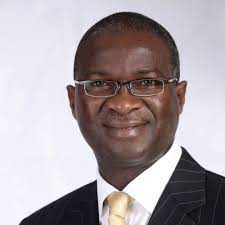By Modestus Umenzekwe
On the 1st day of November 2023 at the University of Benin (UNIBEN) Edo State, the immediate past Honourable Minister of Works and Housing of the Federal Republic of Nigeria, Babatunde Raji Fashola (SAN) was the Lecturer at the19th Justice Idigbe Memorial Lecture. The giant indeed showed the stuff he is made of, a man who believes in positive and symbiotic social contract and nothing less, reawakened Nigerians on their duties as citizens.
Therefore, what I intend to do here is to bring to the fore those vital aspects of this great lecture titled “Duty and Citizenship–The Social Contract”, which is a clarion call on Nigerians to think of what they can do for Nigeria first and not what the nation will do for them, even though their protection is intrinsically tied in the social contract.
Fashola a man who served the nation consistently for 24 years and still counting could be described as a born leader, philosopher and lecturer per excellence. Even though he has stepped aside to have a holiday, so to say, he has continued to impact society in so many other ways. What this means is that politics is not everything. He is a scholar too. He has kept his brain brilliantly busy by delivering lectures which involve research; he still burns the midnight candle in search of new knowledge despite attaining the pinnacle of his political career in Nigeria. This, for me, is to say that Fashola still has a lot to offer to this nation.
Still on the lecture, according to Fashola, the lecture was of course organized in honour of a truly outstanding Nigerian, jurist and patriot, the late Justice Chukwunweike Idigbe, who sadly departed this world on 31st July, 1983.
After the pleasantries, Fashola, an Alumnus of UNIBEN, you could imagine the aura, the ambiance and the nostalgia; a former Governor of Lagos State and former Minister of Power, Works and Housing, now coming back to his former school to deliver a lecture, what a wonderful recollection of memories. He delved straight into the business of the day with the question, ‘What then was it about this Nigerian whose legacy is imperishable?’ he questioned rhetorically. Justice Chukwunweike C. Idigbe, JSC was a dutiful citizen and worthy Nigerian patriot, he answered.
Fashola of course made choice of the title of the lecture having examined the life and time of the erudite legal icon, Justice Chukwunweike C. Idigbe, JSC.
While giving background to his lecture, Fashola projected that extraordinary role among others which made Idigbe’s legal activities very imperishable. According to Fashola, the protagonist of this lecture exemplified what is expected of a good citizen when he rose up to the call of duty at a time and used his good office to salvage an obviously sad situation in Nigerian judiciary. “Justice Idigbe persuaded a full panel of the Supreme Court to reverse their previous decisions which were binding precedents and constraints to doing justice in the case under consideration.” Fashola was actually speaking about Idigbe’s judgement in the case of Bucknor-MacLean vs Inlaks report in (1980) 8 11 SC 1. “That case for me demonstrated Justice Idigbe’s humanity, compassion, sense of justice and fairness to his fellow citizens.” This is the crux of the matter.
Having dealt with the personality of Justice Idigbo, he then explained social contract and what it entails. “I believe that many of us are familiar with the concept of the social contract first propounded by a Swiss philosopher, Jean-Jacques Rousseau, sometime in 1762 about the relationship between the state, and the Government on one hand, and the citizen on the other hand. That contract implied confers certain expectations and benefits on citizens in exchange for certain service to be performed by the state in the conduct of their affairs. These expectations and benefits are expressed as rights, some of which are classified as fundamental and set out in the case of Nigeria, in Chapter 4 Section 24 of the 1999 Constitution as amended.”
He stated that those rights which are fundamental, are expressly conferred on “every person” as listed in Sections 33, 34,35,36,38,39,40 while there are other rights, which inure to the benefit of citizens of Nigeria only, which are conferred on “Every Citizen” as distinct from “Every Person” are to be found in: Section 37, which guarantees and protects citizens of the privacy of their homes, correspondence, telephone, conversations and telegraphic communications; Section 41 (1) which entitles citizens to move freely throughout Nigeria, to reside in any part thereof and assures them of full protection from being expelled from Nigeria or being refused entry into Nigeria subject to the qualification in sub-section (2) about laws which are justified in a democracy to impose restrictions of movement on suspects of crime; Section 42 (1) and (2) which protects the citizen from discrimination; Section 43, which confers the right to own immoveable property on citizens.
“The point to make at this stage about these rights is that they are enforceable in the same way as those other fundamental rights, except with the added bonus that Section 46 (4) (b) also confers additional benefits on citizens only, where they are indigent, to get financial assistance to engage a legal practitioner. “
According to Fashola, this is the heart and matter of the social contract; Citizens enjoying certain rights over and above every person. But those rights do not come alone, they come with duties.
He stated that it is unfortunate that citizens are quick to ask for their rights without a corresponding request for duties and obligations “This is not helpful for our National Development, and I will attempt to demonstrate this shortly. But permit me to quickly pivot to the issue of citizenship.
“The question to ask in our relationship as citizens, is whether we have consciously acknowledged that we owe a debt/duty of allegiance to Nigeria in our relationship with her when we assert our rights? Have we asked for our rights first instead of discharging our allegiance? Indeed, what constitutes our allegiance to our country? But before I proceed further, let me highlight a few examples of some of the protection that citizenship has afforded us in recent times. During the Covid-19 pandemic, we all recall that the Nigerian Government closed the international borders to all traffic as many other Governments did in their countries in order to contain the pandemic. But I recall vividly that whilst some countries, for fear of spreading the virus further, refused entry to their own citizens, Nigeria’s government granted entry to Nigerian citizens who were returning home even at the risk of bringing in the virus to the country.
“That was, for me, a profound expression of citizen protection offered by our country, in contrast to the seeming status of statelessness other countries dealt to their citizens when they refused them entry at that time of extreme vulnerability. During the outbreak of war between Russia/Ukraine, Nigeria arranged the evacuation and return to Nigeria of her citizens caught in the war. She had no business with citizens of other countries. But did this and many similar acts resonate with us? Or were they just what was expected of our country and government?”
He reminded his listeners that as citizens they are severally saved from criminals by law enforcement agents as part of their right as citizens. “On the domestic front, how many of us have been saved from criminals, by law enforcement, or have had the fire brigade come to put out fire in our homes or places of business, or benefited from healthcare in a government facility?
“These are instances of government offering its protection in exchange for our allegiance, even if admittedly there is scope for improvement. The question is whether we understand that these acts are acts of protection because we are citizens, and are we aware of our allegiance when we get these services?” He asked.
Speaking on what makes us citizens, he said “The answer is to be found in the provisions of Sections 25-32 of the constitution as amended in 2023. There are two broad types of citizens; native and naturalised. This is largely applicable in many countries of the world where citizenship is conferred on people who are naturalised citizens, and the Nigerian constitution also provides for naturalised citizenship as is provided for in Section 27 of the constitution.
“While this class of citizenship does not derive from being a native and has some limitations for example such persons cannot be President of Nigeria under Section 131(a) of the constitution, their duty of allegiance is no less than those of native citizens.”
Fashola then spoke in relation to native citizens “There are two broad classes on the subject, classified under the Latin phrases jus soli and jus sanguinis.
“The former refers to citizens by birth acquired from being born in the territory of the state or country while the latter refers to citizenship of birth by having one or both parents who are native to that state or country. Nigeria has adopted the sanguinis route in 25 (1)(a)(b) about people born before 1960, the date of independence, such that if you were born in Nigeria before that date with parents or grandparents who belonged to a community indigenous to Nigeria you were automatically a Nigerian citizen by birth. And in section 25(1)(c), the sanguinis right to citizenship by birth is reinforced by providing that even if you were born outside Nigeria to at least one parent who is Nigerian, you were a Nigerian citizen by birth.”
He said this explains why under the 1999 Constitution, Nigerians, for the first time, could have dual citizenship under Section 28(1) of the constitution because they may have been born in countries where the jus soli applies to Nigerian parents.
But this protection of dual citizenship, he added, is not afforded to those who acquired citizenship of Nigeria by registration or naturalisation; on the contrary only citizens by birth, jus sanguinis, can be dual citizens under Nigerian constitution.
“For some reason, the drafters of the constitution have similarly set out our duties first in Section 24, before proclaiming our rights by way of protection in the latter parts of the constitution in Sections 33 – 46. The second instructive point is that whereas between sections 33 – 46 there are 14 (FOURTEEN) provisions of the constitution dealing with rights and how to benefit from them, Section 24 (a)-(f) which deals with our duties only asks us to do 6 (SIX) things.
“Now what are those 6 (SIX) things that Section 24 ask of citizens of Nigeria: (a) abide by this Constitution, respect its ideals and its institutions, the National Flag, the National Anthem, the National Pledge, and legitimate authorities; (b) help to enhance the power, prestige and good name of Nigeria, defend Nigeria and render such national service as may be required; (c) respect the dignity of other citizens and the rights and legitimate interests of others and live in unity and harmony and in the spirit of common brotherhood; (d) make positive and useful contribution to the advancement, progress and well-being of the community where he resides; (e) render assistance to appropriate and lawful agencies in the maintenance of law and order; and (f) declare his income honestly to appropriate and lawful agencies and pay his tax promptly.”
Fashola made it clear at the lecture that security of lives and property is the responsibility of all. “Ladies and gentlemen, before I conclude, let me place on record my thoughts about section 14(2)(b) of the Constitution which provides that “the security and welfare of the people shall be the primary purpose of government. This has often been understood or dare I say misunderstood as suggesting that this is the responsibility of a particular level of Government. The first point I wish to make about this section and the way some of us have perhaps chosen to misunderstand it is that the word “government” used in that section is a small ‘g’ not in capitals.
“While this is not a discussion on interpretation of statutes for lawyers, it is helpful to the general public to point out that “government” used in that section refers to all levels of Government and not one level.
“Further readings of the responsibilities of Governments set out in the second and fourth schedules of the constitution for Federal, State and Local Governments will show that no particular one of them bears responsibility for “security,” although the Federal Government has responsibility for the Army, Police and Arms. This is not the same as having sole responsibility for security.”
He disclosed that having reviewed the provisions of the constitution relating to the promise of state, duties, entitlement to citizenship and our rights, “I think it must be eminently clear that the social contract is an offer of duties by us, in exchange for the protection of the state and not the other way around. If I may say so, the country that some of us choose to denigrate with our words and actions really owes us nothing because there is no social contract if we offer no duties.
This is what must commend the life and times of Hon. Justice Chukwunweike Idigbe of blessed and noble memory, to us as citizens. Like him we must offer service and duty in private and public capacities to Nigeria first, before we can expect protections and assertion of rights. This is the proper order for the working of the social contract.



